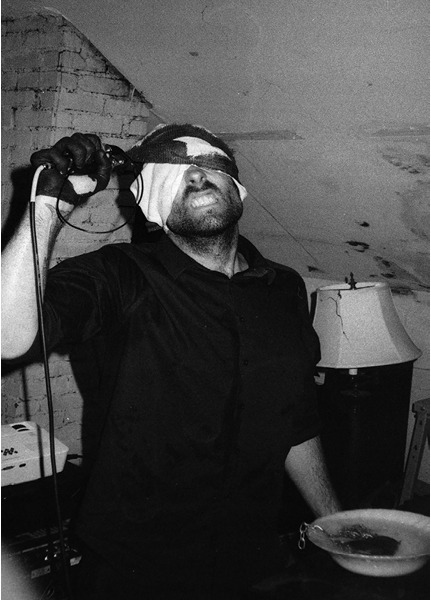
TO FALL BACKWARD AND BLINDFOLDED INTO THE LAP OF A GODDESS
first performed on July 18, 2018
Jazz Gallery Center for the Arts, Milwaukee, WI
performed 25 times in 2018
PETER J. WOODS
Milwaukee, WI
692598209f692598209t692598209a692598209m692598209p692598209r692598209o692598209d692598209u692598209c692598209t692598209i692598209o692598209n692598209s692598209@692598209g692598209m692598209a692598209i692598209l692598209.692598209c692598209o692598209m
ftamproductions.com
TO FALL BACKWARD AND BLINDFOLDED INTO THE LAP OF A GODDESS
PETER J. WOODS
In the first portion of “To Fall Backward and Blindfolded Into the Lap of a Goddess,” a solitary figure with a mouth full of chains repeatedly attempts to speak. The words are muffled but also amplified via a contact mic run through a distortion pedal, so only moments of speech break through walls of distortion. As this happens, I slowly encase my head in black fiberglass casting tape. The lights suddenly go out, and the second section begins. Video of a white curtain slowly blinks on the wall behind me, repeatedly appearing for a few seconds and then returning to black. I let my head fall backwards and slowly pull the chains from my mouth. The video of the curtain continues to blink on and off, creating a silhouette of my chain removal ritual. As time progresses, spurts of blood-like paint cover the white curtain. The lights suddenly turn on as the third segment begins. The room is filled with feedback coming from an amplified pair of shears. A heavy and repetitive drone begins. I spend the rest of the performance violently cutting the cast off of my head. Once removed, I stare open- mouthed and exhausted at the audience as the drone continues until the lights go off.
For the past few years, I have largely centered my work around one question: in what ways do the actions of radical communities (and, in particular, radical music communities) reinforce the dominant systems they hope to combat? While this question does, at its core, hold the assumption that the political actions of radical communities will reinscribe the oppressions they hope to challenge, my goal is not to undermine the (often invaluable) work taken by these groups. Instead, I raise the question as an invitation towards nuance, to better understand the fullness of our work, and to continually raise the difficult question of how we are in the world. “To Fall Backward and Blindfolded Into the Lap of a Goddess” raises this question on a broad scale, voicing concerns about whether an inward focus on addressing our own internal politics overlooks the global forms of violence we remain complicit in. When pulling chains from our mouths or destroying the blindfold we ourselves created, what bloody curtains and forms of violence do we ignore or obscure? And how can we possibly strike a balance between the two?